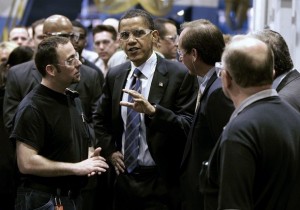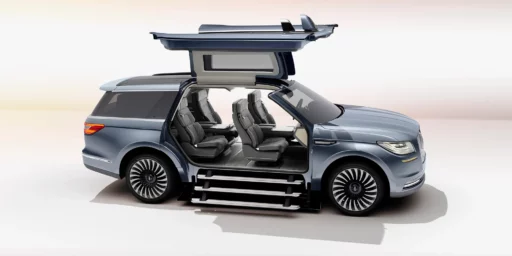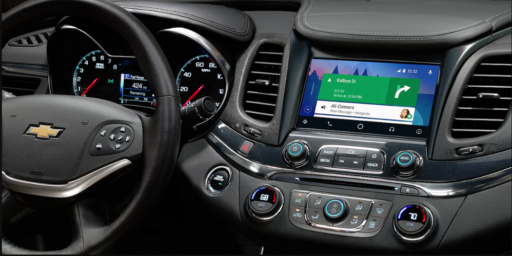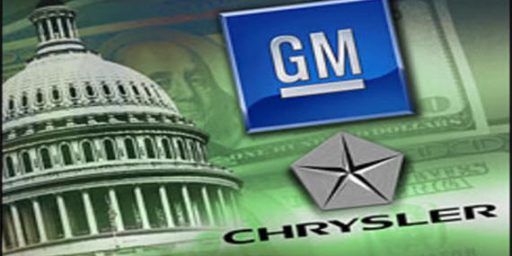Obama to Run GM, Chrysler
President Obama says he’ll help GM and Chrysler but they’ll have to agree to some “pretty drastic changes.”
“We will provide them some help,” Obama said. “I know that it is not popular to provide help to auto workers — or to auto companies. But my job is to measure the costs of allowing these auto companies just to collapse versus us figuring out — can they come up with a viable plan?” He added: “If they’re not willing to make the changes and the restructurings that are necessary, then I’m not willing to have taxpayer money chase after bad money.”
[…]
“Everybody is going to have to give a little bit — shareholders, workers, creditors, suppliers, dealers — everybody is going to have to recognize that the current model, economic model, of the U.S. auto industry is unsustainable,” Obama said.
The president said he agreed with a questioner at the town hall — a Maryland woman with family members who work for GM and Ford Motor Co. — that “there’s been a lot of mismanagement of the auto industry over the last several years.”
Obama stressed that the industry must be preserved, not only symbolically but because of the large number of jobs connected to the companies and suppliers. Obama said his job was to protect U.S. taxpayers and he wouldn’t spend federal dollars on “a model that doesn’t work.” “A lot of it’s going to depend on their willingness to make some pretty drastic changes. And some of those are still going to be painful,” he said.
[…]
The president said that even as the economy bounces back, Detroit can’t focus on “trying to build more and more SUVs and counting on gas prices being low.” In that vein, the administration on Friday is expected to announce plans to raise fuel efficiency standards by 2 miles per gallon to 27.3 mpg for new cars and trucks in the 2011 model year, an administration official said Thursday. That would be the first increase in passenger car standards in more than two decades.
Under the changes, new passenger cars will need to meet 30.2 mpg for the 2011 model year and pickup trucks, sport utility vehicles, and minivans will need to reach 24.1 mpg, according to the official, who spoke on condition of anonymity because the person was not authorized to speak in advance of the announcement.
White House spokesman Robert Gibbs said Obama will announce his strategy for the auto industry before he leaves for Europe on Tuesday. The announcement is likely to come on Monday. Gibbs said Obama still thinks U.S. automakers build cars that Americans want to buy. Both he and the president own Ford Escape hybrids. “It’s a nice car,” Gibbs said. “It really is.”
After speech to the Atlantic Council last evening, EU Commissioner for Competition Neelie Kroes was asked how she would handle this very question were she in charge of the U.S. economy. She noted that she didn’t have to put herself into any hypothetical situations, because they’re facing exactly these decisions in Europe, too. And her answer is similar to Obama’s: No help for industries that ran themselves into the ground with poor management decisions unless they come up with a radical restructuring plan that recasts the business to compete successfully for the long term. And, yes, that includes being “green” for sustainability.
Obama’s absolutely right that, if the federal taxpayer is going to bail out these companies, then the government has a right to insist on major restructuring. He’s wrong, though, and Kroes is right on how to get there.
While the government employs some really smart people with substantial knowledge of economic matters, it has no specialized expertise in how to run an automobile company. To be sure, the people actually running GM and Chrysler haven’t exactly shown themselves as geniuses in that regard. But, to be fair, they’ve been operating under the pressure of quarterly shareholder reports and hamstrung by a labor structure from a bygone era, which makes it difficult to make good strategic choices.
So, absolutely, Obama’s people (and/or Congress) should approve a restructuring plan before giving the auto companies another dime. But the auto companies, not the government, should draw up the plan.







The best of the “major restructuring” plans would have been bankruptcy. It’s what should ahve been allowed to happen.
Among other things, it would have allowed the copanies to shed the Unions, which are the only thing, really that can be changed. Governemnt interference in the car business also helps make car companies unviable,(How long can they continue to be forced into making small cars that nobody’s buying and be expected to survive the financial burden?) … but apparently there’s no stopping that.
They may be viable with the unions or the government but not both. Unless and until the unions are removed, America car conmpanies will never be viable.
But that will never be allowed to happen. Face it, the bailout of car companies was never about saving the car companies, it was about bailing out the unions. Absent the unions, the car companies would have been allowed to go bankrupt without any discussion on the topic.
So, we’ll continue pouring good money after bad on this, because nobody wants to face the real problems.
Government has proven itself so good at running things. Particularly this Government (more debt than all of the previous Presidents in 60 days). Look how well the education system, penal system, tax system, and every other system the government has its fingers in. I know Freddy and Fannie were so successful that our grandchildren yet unborn will be paying the bill. I read today if Obama gets his way with the budget, the average American household will be indebted $180+ thousand. People are going to wake up soon and realize if they make $10 an hour, they are considered rich. Obama and his friends are thieves. Stealing from those who work to give to those who do not.
What specifically are these changes and restructurings?
I hear this a lot. What specific mismanagement has led to their current problems and how does compare to Toyota and their current problems?. Is there a link?
Indeed, and perhaps more to the point of this administration, are we really to assume that the government that within a month has opened the American people up to a debtload that is bigger than all the debt incurred from the time of President Washington to President Bush, inclusive, will have a bloody clue as to how to keep a car company afloat?
Now perhaps we better understand why Obama wants to make Pot legal, huh?
I’m curious as to which market niche or region President Obama thinks GM and Chrysler can become competitive in. India’s Tata Motors has lowered the bar in the sub-subcompact market with the Nano, a $2,000 50mpg car. Heck, I don’t see GM or Chrysler being able to compete with the subcompact Nano Europa that Tata will be selling in Europe soon.
The luxury market? For that you need fit and finish and GM and Chrysler have been lagging there. They drove their position in the market into the grounds decades ago and a market once lost is hard to recapture.
The increasing importance of Indian and Chinese automakers will effectively close those markets to European and American automakers. That’s why Ford, with its strong European business, is positioned better than GM which has been pursuing the Chinese market (with some success).
At this point the Volt is only saleable with stiff per unit subsidies and the scalability of its production, like the scalability of production of hybrids, is in serious doubt. Not to mention that it certainly looks as though high mpg internal comubustion vehicles will be greener than hybrids for the foreseeable future. Or that our power generation system can’t support a mass conversion to electric vehicles and probably won’t be able to for decades. And there is no Moore’s Law in batteries.
So what’s it going to be? Will GM specialize in cars that can only be sold in the U. S. and only there with a government subsidy? Sounds like a winning formula to me.
Now if he can just make the trains run on time, we won’t need any cars anyway.
I worked at GM when I was much younger, but to start with they have an ineffecient business planning process of bringing cars from vision to production. Only recently have they made progress on this. Poorer quality in the design process of vehicles, an inconsistent product portfolio in individual brands and an unwillingness to take much risk in small to midsize cars. Now granted some of this has changed over the years, but these are all fixable areas where GM, Ford and Chrysler have lagged behind the Japanese auto makers.
One more poor management anecdote. I was speaking with a GM engineer several years ago and he told me that his division had addressed this issue and that it would cost less than $75 per vehicle. Management decided that this was to great a cost for a car with a silent cabin.
Re: automakers’ management problems
GM, Chrysler, and Ford all have much more extensive bureaucracy than Toyota does. This encumbers every part of their operations. They have much larger dealer networks which produces additional burdens. They have many more retired employees to support.
I think we can agree that, while it’s outrageous for a Democratic President to tell management how to run a company, it’s absolutely awesome for Republican Congressmen to tell a company how much to pay its workers.
@Dave:
At the mid-ranges, I’ll put the Ford Fusion for example up against anything in the class from any other company for design, fit and finish. I drive one. Fabulous car. Of course, then again, the assembly plant is in Mexico, and isn’t Union dominated.
Think about this;
On whose shoulders does that fit and finish issue for plants here in the US, rest? The Company? Or the Unions? Fit and finish is not a design issue, it’s one of proper assembly, and care in workmanship… and it’s the union workers who are responsible for such. Amazing, how slipshod one can get in one’s job when they know they’re not going to get canned for screwing up/off. Look at the degree to which each company is union dominated, and you’ll note there’s a direct correlation between taht factor and shoddy workmanship.
You also mention the added layers of management. Here again, the degree of management required seems to me tied to the domination of unions, since union driven disputes or the constant threat of them, requires more management.
As for cost downs as Grewgills mentions, that is a product of profits being so marginal. Why are they marginal? Unions, and their excessive wage and bennie demands.
Again I say; Unions and government are killing off American car makers. The compaines can stand one or the other, but not both. The chances of us getting government out of the mix is small in the near future, as is getting unions out of the way. But of the two, the Unions seems the most promising place to start getting rid of the unessesary and counter productive junk. A bankruptcy would be the best way to go to that end. But the Democats, firmly in the pckets of the unions, will never permit it.
I oppose both. Indeed, I oppose the bailouts.
If we’re going to have a bailout, however, it makes sense, as part of a bailout plan that helps both management and workers, to open up labor contracts for discussion. But the discussion should be between management and labor with Congress in a sign-off role.
What specifically are the ineffeciencies?. The new Chevrolet Camaro went from vision to production in 3-1/2 years(ish). That seems like a long time but it’s really not.
I agree that used to be the case. That no longer is the case nor has been for some time…but like said above, they did make their own bed and perception is hard to reverse.
Risk?
Of course you oppose both, James. You make sense. So you have a coherent position.
I’m a qualified auto bailout supporter on grounds of the “weak version” of the support argument, advanced IIRC by Tyler Cowen. It comes down to, “As of Fall 2008 [now Spring 2009] the macroeconomic consequences of at least two of the Big Three hitting Chapter 7 would be much much worse than the cost of the bailout. If $20-50 billion keeps them going for another year to eighteen months before collapse, the economy should be in a better position to absorb the shock then.”
It’s not a particularly inspiring rationale.
This is true…but it is also true that starting in 1994, at least GM ended the “cradle to grave” policy of pension/healthcare. Now, that may be a prehistoric concept from the good ole’ days when good people were hard to get…the fact is this “restructuring” started 15 years ago and it didn’t take a car czar to make it happen.
For better or worse…that’s the only reason I support the loans. Were we in better economic standing i’d rather see them file…but we are not…and i’ve said it before, most people don’t realise how many people would be affected.
As I saw/see it the problem with that line of reasoning is that our government doesn’t work that way. Having done something becomes the justification for doing it in perpetuity. We’ve had a helium subsidy (in one form or another) for generations. I doubt that many people know why we have it at all.
There are other alternatives for softening the landing for the macroeconomy than paying the auto companies.
Additionally, does anyone really think that the Congress, having approved subsidies for GM and Chrysler in 2008 and 2009, will refuse in 2010? That’s the midterm elections.
Note: Ford. We’re bailing out GM and Chrysler.
That’s right enough. I prolly should have noted I also drive two Buicks… a Rainier SUV that’s my daily driver,a nd my long hauler, and a LaCrosse belonging to Mom that I’ve put several thousand miles on. I’ve been impressed with both. Usually, I’ve been a Chevy man most of my life. I’ve owned several. I’ve noted workmanship and design both improving over the last decade or so.
Didn’t seem germaine at the time, though I can see now where it would have been. (I know, the Germans don’t have anything to do with it…:-D )
As an aside, I’ll add this: If who we’re bailing out is of interest in those assigning blame, the businesses we’re bailing out are without varience, already among the most heavily regulated in the country. Should we take that as a clue to the ultimate effect of federal regulation vs the viability of a busienss? Shuld we also be looking at the future of other, similarly regulated businesses, such as energy companies, for example?
Although FDR would likely suffer Chagrin caused by his infantile political paralysis, his buddy Joe would certainly be proud of Obama for his boldness and for not Stallin’ in implementing his agenda!
Except those made by evil/inept Union labor, right? I mean, you went that entire post without accusing Unions of being the cause of everything wrong in the industry. An oversight, I’m sure.
And the belief that Obama’s people (and/or Congress) can accurately assess a restructuring plan would emanate from where exactly?
Well, no. But feel free to keep building your ludicrous strawmen.
See previous comment. Maybe one of the bellmen can help you with all that baggage you refuse to let go of.
“”GM, Chrysler, and Ford all have much more extensive bureaucracy than Toyota does. This encumbers every part of their operations. They have much larger dealer networks which produces additional burdens. They have many more retired employees to support.””
“”””””””””””””””””””””””””””””””””””””””””””””””””
So the perfect solution is to get a dictator to work the workers to death before they can retire, then make the buyers drive a hundred miles for repairs.[lol]
Let’s all just take a moment to contemplate those wonderful Russian and eastern block automobiles that were icons of Marxist production control and worth waiting 7years to acquire.
Trabant,Yugo, and the very famous Lada for which the Russians had to get the Italians to produce!
Carbon credits anyone??
@ Michael
I put up with a lot of crap from cars I’ve owned for years, during the years when the quality wasn’t so good. I owned a Pinto, for example. Drove a Chevette for a while, too. I’ve watched for years as other companies did better in qualuty and price marks because of the unions.
But you see, there’s something called principle that guides my actions there, even today; I will not drive a non-American car, because I don’t like the idea of shipping my dollars out of the country. Where I can, I buy American. Always have. I’m not happy about my money going to unions, but there it is; Buying American is the choice I made years ago, and I’ve never wavered from it. So, I bite my tounge and buy American. I’m willing to bet you’ve no idea why.
(Aside:My being solidly an American vehicle buyer is particularly true since Ive started RV’ing because for the most part the stuff made by foriegn companies simply isn’t up to the drill in the weight handling.)
And everything wrong with the industry? No. Just the biggest part of the probelms. And given the bankruptcy option, the easiest to solve…. If, that is, saving the unions wasn’t the government’s apparent top priority.
Bithead;
Them’s fightin’ words, I still own a Pinto, one of the best D**ned values ever to role of an assembly line, and tougher than elephant butter!
I spent about 6 weeks in Moscow and Leningrad back in ’86. Yugo’s were in high demand, because you could get one, and it was as good or better than any of the used autos available to the proles.
One thing you didn’t mention about the however many year wait for new cars in CCCP – you paid for the car in full up front just to get on the list.
Command economies. Is there anything they can’t do?
‘Them’s fightin’ words’
yeah. I had the 72 withe the old @ron Duke. Car wasn’t bad, and the old engine just wouldn’t quit. Electrical problem were a regular feature, though… and I never could keep a tranny in the thing. In 75k, it went trhough 3 of em.